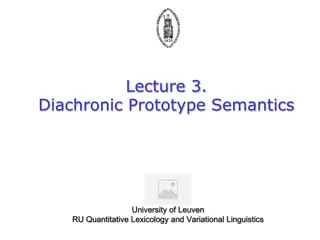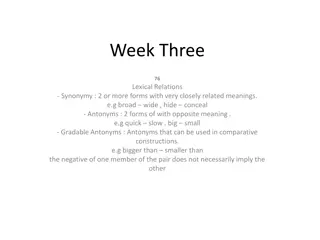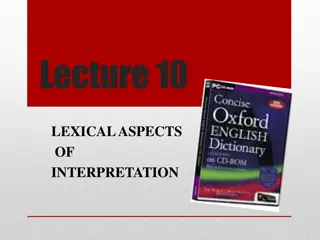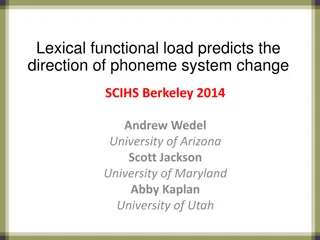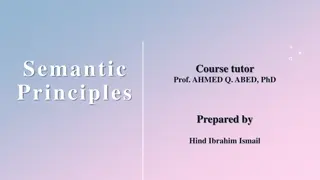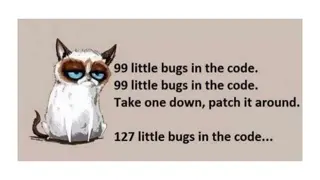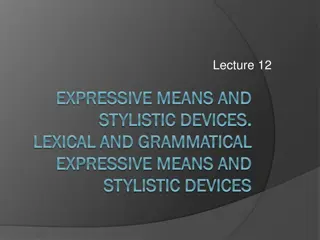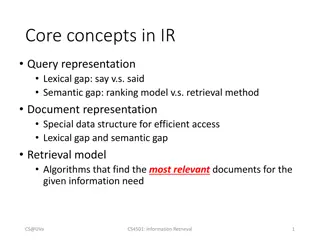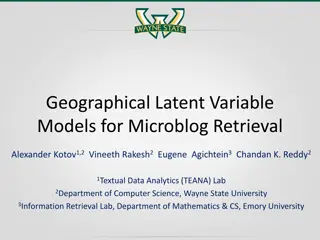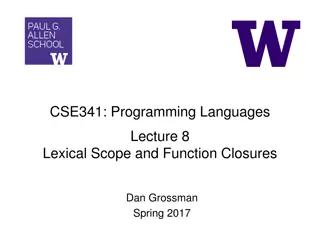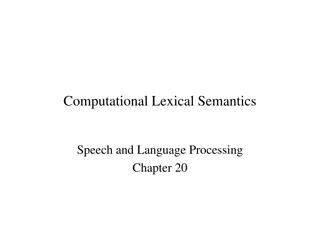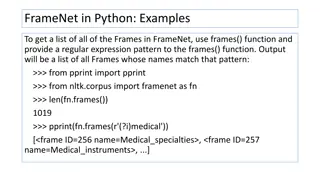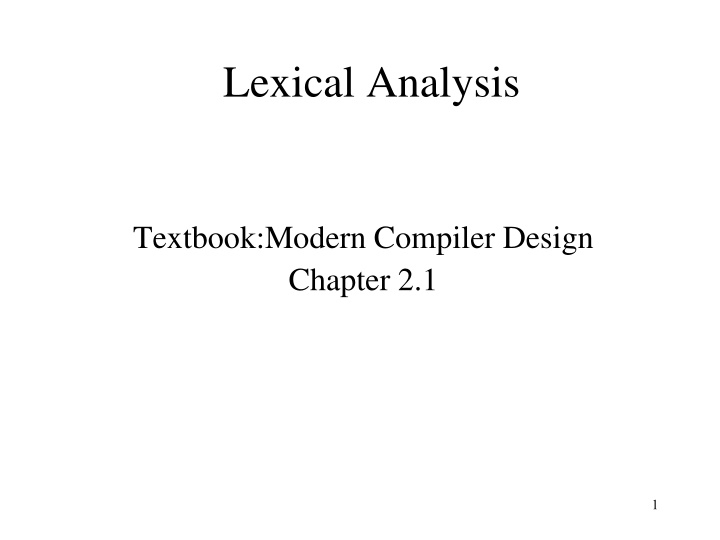
Lexical Analysis in Modern Compiler Design
Explore the fundamentals of lexical analysis in modern compiler design with examples including counting lines in a text file, JLex specifications, and basic compiler phases. Learn about tokens, regular expressions, error handling, and the automatic creation of lexical analysis. Dive into the essential roles of lexical analysis in the compiler process and understand the stages from the front-end to the back-end.
Download Presentation

Please find below an Image/Link to download the presentation.
The content on the website is provided AS IS for your information and personal use only. It may not be sold, licensed, or shared on other websites without obtaining consent from the author. If you encounter any issues during the download, it is possible that the publisher has removed the file from their server.
You are allowed to download the files provided on this website for personal or commercial use, subject to the condition that they are used lawfully. All files are the property of their respective owners.
The content on the website is provided AS IS for your information and personal use only. It may not be sold, licensed, or shared on other websites without obtaining consent from the author.
E N D
Presentation Transcript
Lexical Analysis Textbook:Modern Compiler Design Chapter 2.1 1
A motivating example Create a program that counts the number of lines in a given input text file 2
Solution (Flex) int num_lines = 0; %% \n ++num_lines; . ; %% main() { yylex(); printf( "# of lines = %d\n", num_lines); } 3
Solution(Flex) initial int num_lines = 0; newline %% \n ++num_lines; . ; %% main() { yylex(); printf( "# of lines = %d\n", num_lines); } ; 4
JLex Spec File Possible source of javac errors down the road User code Copied directly to Java file %% DIGIT= [0-9] LETTER= [a-zA-Z] JLex directives Define macros, state names %% YYINITIAL Lexical analysis rules Optional state, regular expression, action How to break input to tokens Action when token matched {LETTER} ({LETTER}|{DIGIT})* 5
Jlex linecount File: lineCount import java_cup.runtime.*; %% %cup %{ private int lineCounter = 0; %} %eofval{ System.out.println("line number=" + lineCounter); return new Symbol(sym.EOF); %eofval} NEWLINE=\n %% {NEWLINE} { } [^{NEWLINE}] { } lineCounter++; 6
Outline Roles of lexical analysis What is a token Regular expressions Lexical analysis Automatic Creation of Lexical Analysis Error Handling 7
Basic Compiler Phases Source program (string) Front-End lexical analysis Tokens syntax analysis Abstract syntax tree semantic analysis Annotated Abstract syntax tree Back-End 8 Fin. Assembly
Example Tokens Type Examples ID NUM REAL IF COMMA NOTEQ LPAREN RPAREN foo n_14 last 73 00 517 082 66.1 .5 10. 1e67 5.5e-10 if , != ( ) 9
Example Non Tokens Type comment preprocessor directive Examples /* ignored */ #include <foo.h> #define NUMS 5, 6 NUMS \t \n \b macro whitespace 10
Example void match0(char *s) /* find a zero */ { if (!strncmp(s, 0.0 , 3)) return 0. ; } VOID ID(match0) LPAREN CHAR DEREF ID(s) RPAREN LBRACE IF LPAREN NOT ID(strncmp) LPAREN ID(s) COMMA STRING(0.0) COMMA NUM(3) RPAREN RPAREN RETURN REAL(0.0) SEMI RBRACE EOF 11
Lexical Analysis (Scanning) input program text (file) output sequence of tokens Read input file Identify language keywords and standard identifiers Handle include files and macros Count line numbers Remove whitespaces Report illegal symbols [Produce symbol table] 12
Why Lexical Analysis Simplifies the syntax analysis And language definition Modularity Reusability Efficiency 13
What is a token? Defined by the programming language Can be separated by spaces Smallest units Defined by regular expressions 14
A simplified scanner for C Token nextToken() { char c ; loop: c = getchar(); switch (c){ case ` `:goto loop ; case `;`: return SemiColumn; case `+`: c = getchar() ; switch (c) { case `+': return PlusPlus ; case '= return PlusEqual; default: ungetc(c); case `<`: case `w`: } return Plus; } 15
Regular Expressions Basic patterns Matching x The character x . Any character expect newline [xyz] Any of the characters x, y, z R? An optional R R* Zero or more occurrences of R R+ One or more occurrences of R R1R2 R1 followed by R2 R1|R2 Either R1 or R2 (R) R itself 16
Escape characters in regular expressions \ converts a single operator into text a\+ (a\+\*)+ Double quotes surround text a+* + Esthetically ugly But standard 17
Ambiguity Resolving Find the longest matching token Between two tokens with the same length use the one declared first 18
The Lexical Analysis Problem Given A set of token descriptions Token name Regular expression An input string Partition the strings into tokens (class, value) Ambiguity resolution The longest matching token Between two equal length tokens select the first 19
A Jlex specification of C Scanner import java_cup.runtime.*; %% %cup %{ private int lineCounter = 0; %} Letter= [a-zA-Z_] Digit= [0-9] %% \t { } \n { lineCounter++; } ; { return new Symbol(sym.SemiColumn);} ++ {return new Symbol(sym.PlusPlus); } += {return new Symbol(sym.PlusEq); } + {return new Symbol(sym.Plus); } while {return new Symbol(sym.While); } {Letter}({Letter}|{Digit})* {return new Symbol(sym.Id, yytext() ); } <= {return new Symbol(sym.LessOrEqual); } < {return new Symbol(sym.LessThan); } 20
Jlex Input regular expressions and actions (Java code) Output A scanner program that reads the input and applies actions when input regular expression is matched regular expressions Jlex scanner tokens input program 21
Ambiguity Resolving Rules Between two tokens with the same length use the one declared first Find the longest matching token while {return(while);} [a-zA-Z][a-zA-Z0-9]* {return(ID);} Is that regular? 22
How to implement ambiguity resolving 23
Pseudo Code for Scanner Token nextToken() { lastFinal = 0; currentState = 1 ; inputPositionAtLastFinal = input; currentPosition = input; while (not(isDead(currentState))) { nextState = edges[currentState][*currentPosition]; if (isFinal(nextState)) { lastFinal = nextState ; inputPositionAtLastFinal = currentPosition; } currentState = nextState; advance currentPosition; } input = inputPositionAtLastFinal ; return action[lastFinal]; } 24
Pathological Example if [a-z][a-z0-9]* [0-9]+ [0-9] . [0-9]*|[0-9]* . [0-9]+ (\-\-[a-z]*\n)|( |\n|\t) . { return REAL; } { ; } { return IF; } { return ID; } { return NUM; } { error(); } 25
int edges[][256] ={ /* , 0, 1, 2, 3, ..., -, e, f, g, h, i, j, ... */ /* state 0 */ {0, ..., 0, 0, , 0, 0, 0, 0, 0, ..., 0, 0, 0, 0, 0, 0} /* state 1 */ {13, ..., 7, 7, 7, 7, , 9, 4, 4, 4, 4, 2, 4, ..., 13, 13} /* state 2 */ {0, , 4, 4, 4, 4, ..., 0, 4, 3, 4, 4, 4, 4, ..., 0, 0} /* state 3 */ {0, , 4, 4, 4, 4, , 0, 4, 4, 4, 4, 4, 4, , 0, 0} /* state 4 */ {0, , 4, 4, 4, 4, ..., 0, 4, 4, 4, 4, 4, 4, ..., 0, 0} /* state 5 */ {0, , 6, 6, 6, 6, , 0, 0, 0, 0, 0, 0, 0, , 0, 0} /* state 6 */ {0, , 6, 6, 6, 6, , 0, 0, 0, 0, 0, 0, 0, ..., 0, 0} /* state 7 */ ... /* state 13 */ {0, , 0, 0, 0, 0, , 0, 0, 0, 0, 0, 0, 0, , 0, 0} 26
Pseudo Code for Scanner Token nextToken() { lastFinal = 0; currentState = 1 ; inputPositionAtLastFinal = input; currentPosition = input; while (not(isDead(currentState))) { nextState = edges[currentState][*currentPosition]; if (isFinal(nextState)) { lastFinal = nextState ; inputPositionAtLastFinal = currentPosition; } currentState = nextState; advance currentPosition; } input = inputPositionAtLastFinal ; return action[lastFinal]; } 27
Example Input: if --not-a-com 28
final state input 0 1 if --not-a-com 2 2 if --not-a-com 3 3 if --not-a-com 3 0 if --not-a-com return IF 29
final state input 0 1 --not-a-com 12 12 --not-a-com 12 0 --not-a-com found whitespace 30
final state input 0 1 --not-a-com 9 9 --not-a-com 9 10 --not-a-com 9 10 --not-a-com error 9 10 --not-a-com 9 0 --not-a-com 31
final state input 0 1 -not-a-com 9 9 -not-a-com 9 0 -not-a-com error 32
Efficient Scanners Efficient state representation Input buffering Using switch and gotos instead of tables 33
Constructing Automaton from Specification Create a non-deterministic automaton (NDFA) from every regular expression Merge all the automata using epsilon moves (like the | construction) Construct a deterministic finite automaton (DFA) State priority Minimize the automaton starting with separate accepting states 34
NDFA Construction if [a-z][a-z0-9]* [0-9]+ { return IF; } { return ID; } { return NUM; } 35
Minimization 37
Comments /\*.* \*/ /\*(.|[ \t\n])* \*/ start_code(); /* First comment */ more_code(); /* Second comment */ end_code(); 38
Comments /\*.* \*/ /\*(.|[ \t\n])* \*/ /\*([^*]|[\r\n])*\*/ /* * Common multi-line comment style. */ /* Second comment */ 39
Start States It may be hard to specify regular expressions for certain constructs Examples Strings Comments Writing automata may be easier Can combine both Specify partial automata with regular expressions on the edges No need to specify all states Different actions at different states 40
Comments with Start States %state comment %% <YYINITIAL>/\* ; <comment>\*/ <comment>.|[ \t\n] {YYBEGIN(comment);} {YYBEGIN(YYINITIAL); } ; 41
Do start states add expressive power? 42
Automaton with Start states comment initial 43
NestedComments with Start States static int nestedCount =0; %state comment %% <YYINITIAL>/\* ; <comment>\*/ <comment>.|[ \t\n] {nestedCount++; YYBEGIN(comment);} { if (--nestedCount==0) { YYBEGIN(YYINITIAL); } } ; 45
Missing Creating a lexical analysis by hand Table compression Symbol Tables Handling Macros 46
Summary For most programming languages lexical analyzers can be easily constructed automatically Exceptions: Fortran PL/1 Lex/Flex/Jlex are useful beyond compilers 47




